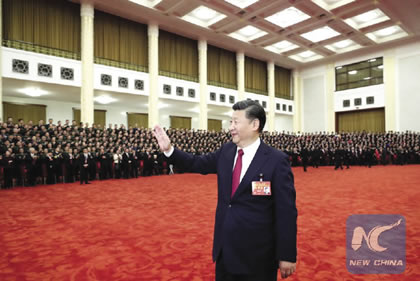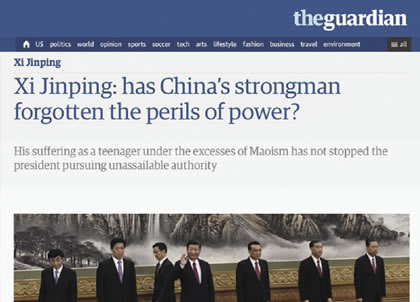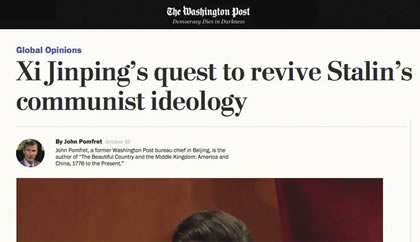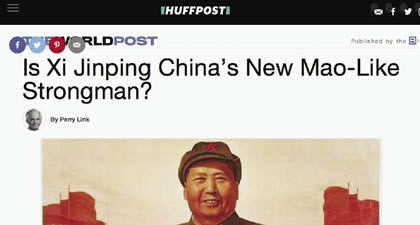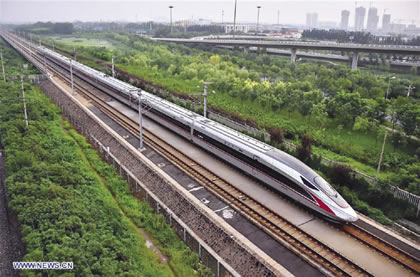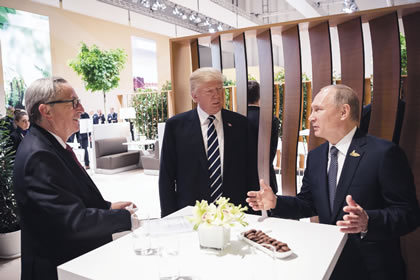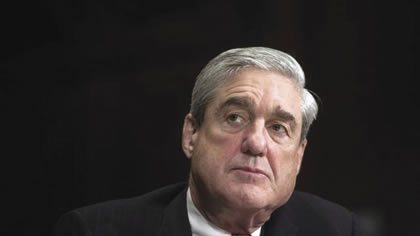HELGA ZEPP-LAROUCHE
What’s Really Happening in China
And What It Means for Americans
This is an edited transcript of the weekly Schiller Institute New Paradigm webcast of Oct. 26 with Helga Zepp-LaRouche.
A PDF version of this transcript appears in the November 3, 2017 issue of Executive Intelligence Review and is re-published here with permission.
Harley Schlanger: Hello, I’m Harley Schlanger from the Schiller Institute. Welcome to this week’s webcast with Helga Zepp-LaRouche, the founder of the Schiller Institute and its chairwoman.
There have been incredible developments over the last week, starting with the continuation and conclusion of the 19th National Congress of the Communist Party of China (CPC), which laid out an absolutely bold strategic perspective for the next 35 years. This has gotten very little coverage in the West, but it’s an event which will shape what happens not just in China, but globally. We’re going to put that on top of our list for discussion today, but we’ll also take up some developments around “Russia-gate” and a few questions that were sent to me during the week.
|
Xinhua/Ju Peng
Xi Jinping, President of China and General Secretary of the China Communist Party, greeting participants at the 19th CPC National Congress in Beijing, Oct. 25, 2017. |
So, Helga, to start with, the 19th Party Congress which just concluded, really was quite incredible, putting forward the idea of a “beautiful China” creating a “beautiful world.” What’s your impression?
Helga Zepp-LaRouche: First of all, I would like to note the fact that the Western media, in their non-coverage and what they decide to focus on, are just completely ridiculous. Their main attention was directed to the fact that Xi Jinping did not present a visible successor. He was just voted in for five more years. This is obviously not the key point.
What this Congress represents is a strategic shift. It is in line with the Belt and Road Initiative and the new model of international relations China has developed under the leadership of President Xi Jinping, and I think the West has not caught up with what this is actually all about. They are so much behind the curve, it is almost absurd.
What Xi Jinping has accomplished in the five years of his Presidency so far, the previous five years, is that he has successfully taken on some of the problems China had, such as corruption, such as a slowing economy, and various other problems, and he has actually been extremely successful.
Everybody who has been in China and has looked at China without prejudices, could not help but notice it—that it has led to a population which for the most part is very satisfied—83% of the people are absolutely happy about what the government is doing. I would like to see the Western country that has such approval ratings.
But what has happened at this 19th Party Congress is truly amazing. In a little more more than a week Xi Jinping has consolidated the party around a manifold perspective, of which I want to start to discuss various aspects:
First of all, in the immediate next three years, by 2020, the aim is to eliminate poverty, to lift the remaining 42 million people who are presently living in poverty in China, above that level. Now, that compares with a similar number of people currently living in poverty in the United States, except that China has about four times the population of the United States, and it compares with the roughly 120 million poor people in the European Union (EU), who have been poor for the last 20 years, with nothing being done about it; there’s no perspective to eliminate poverty in the EU.
From 2020 to 2035, the aim is to make China a moderately prosperous, functioning socialist country; and then from 2035 to 2050, China is to become a completely developed, culturally harmonious, advanced, democratic, socialist and beautiful country.
|
cc/Mgmoscatello
Street scene in Shanghai, April 2, 2011. |
There is an additional element. First of all, what impressed me very much is the focus of Xi Jinping, and also other people who spoke, on the purpose of all this—namely, that it is the improvement of the life of people, that people should live a better life, a happier life. That is completely lacking in the discussion in the West: That the aim of politics is that people should be happy! The pursuit of Happiness is an inalienable right, which was after all in the Declaration of Independence of the young United States.
But there is another aspect to it. Xi Jinping, especially in his concluding remarks, spoke about a socialist model with Chinese characteristics for a new era. And the aim which was formulated very explicitly, was that China will take a global role in creating a beautiful future for all of mankind. Now, that is really something! When has any Western politician had a vision of creating a beautiful future for all of humanity? You have to go back a long way, until you find people even thinking in these terms. China has provided a model of international governance and international relationships based on the sovereignty and respect for the social model of the other country, non-interference, with no attempt to change the system to the Western model or to their own model, but to respect the other countries’ sovereignty.
This is an incredible perspective, because if you look at it from the long arc of human history, this was an initiative which had to be made at a certain point in the development of humanity. There had to be at some point, somebody to say, “we are the human species, the human species is one”—Xi Jinping always calls it the “shared community for the future of mankind”—somebody to put forth a vision of how we can organize our affairs on this planet in such a way that the result is a good life for all people living on this planet.
Westerners tend to not understand that. They tend to either overlook it or denounce it as propaganda, just communist rhetoric; or they cannot imagine that it could be true, because they themselves are so unused to thinking in these terms. The poor power of their imagination is completely unable to imagine that there could be a political leader who thinks that way. But I’m absolutely convinced that Xi Jinping is a Confucian man, that he wants to shape the world in a Confucian harmonic way. People in the West who want to understand what’s going on, should not just push it aside, but really try to grasp it. Because it’s a tremendous potentiality for all of humanity, which must be supported and should be taken up. And I think it’s important that people achieve the intellectual integrity to try to comprehend what he is talking about.
Schlanger: I found it very interesting that Xi traced the period that he described as a “miserable period for China,” to the Opium War, the British Empire’s efforts to force the Chinese to accept opium shipped into China by the British. Because that makes it clear that he’s talking about China emerging from under an imperial system into a new era.
Zepp-LaRouche: Yes. Also very noticeable is that, preceding and during this party congress, the attacks by the Western media against China were just unbelievable, blaming China for the coming crash, and decrying the debt of China—while, in reality, every debt China has incurred is covered by capital assets, because they have invested in the real economy and infrastructure, and therefore in assets which would be there if there were a crash—unlike the Western investments in speculation, in derivatives, which are just virtual and will disappear the moment the crash occurs.
|
Western media calling Xi Jinping a dictator. |
There was an unbelievable barrage of attacks also against President Xi Jinping himself—totally insane comparisons to all kinds of historical figures; it was just absolutely berserk. I noticed a new tone of self-confidence in the way the Chinese media responded to these attacks. They very self-assuredly said that the West does not get it, they don’t understand China, they don’t try to understand China; but moreover, the Chinese model is so clearly superior to the Western model.
In the past, the Chinese have been much more restrained and have held back from saying such things—but now, when these attacks occurred, they said: But look at it, the Chinese socialist model with Chinese characteristics is having these unbelievably positive results, while in the West there is chaos. Especially if you look at the EU, or those in the West who are trying to export their model of Western democracy and human rights. And then they say, those people in the West who speak like that, obviously don’t want China to succeed, and they think China is only doing well when it submits to Western values—but when China is developing, then they regard China as a threat to their world order.
That is just completely ridiculous, they say, and therefore, since the West is collapsing and the influence of the Western media is vanishing, one can just ignore what these Western media are saying.
That is a new tone, and I really like that. There was just a poll in the United States which found that 57% of Americans—more than half—do not believe a word of what is said in the mainstream media. This is quite significant. Obviously the influence of these media is shrinking; they have overdone it; they have tried to pretend that they control everything, including the way people should interpret democratic elections in the United States. But they have overblown it, and I think there is a blowback, and I think that that creates a very interesting new situation.
As for China, everybody should study the speeches of Xi Jinping. There is also a very interesting new three-part documentary on CGTN TV about Xi Jinping, which those who want to understand the man should just watch [China: The Time of Xi]. But study his speeches. When I did so over the years, I was very impressed by the fact that he always puts a lot of emphasis on traditional Chinese culture; he also knows the best periods of the cultures of other countries. When he travels, he always emphasizes the best contributions of the other culture, which I think is very important. He also puts a lot of emphasis on beauty, on the spirit of science. He’s a Renaissance man! We have not been used to having Renaissance men for a long time. My husband is one of them, but they are a rare species. I think people have a lot to discover if they engage in becoming familiar with Xi Jinping.
Schlanger: I found one other thing quite significant, which is, in contrast to the nonsense in the media about Xi personally and about the direction of China, President Trump, when he called Xi Jinping right after the congress ended, congratulated him and spoke of his “elevation,” that is, his re-election, in positive terms.
The President is heading to Asia soon. Can you update us on the prospects for that trip?
Zepp-LaRouche: President Trump will be accompanied by a very large delegation of American businessmen. I am pretty sure that what will be discussed, both in Japan and also in China, is large Japanese-
Chinese investments in American infrastructure. Those who are familiar with the activities of the Schiller Institute, probably know that we have campaigned in the United States since 2014 for the idea that the United States should fully cooperate with the New Silk Road, with the Belt and Road Initiative—and I think this will be on the agenda. I’m pretty sure that the Chinese government and Xi Jinping, especially now with the accomplishment of the 19th Party Congress, will not miss the opportunity to offer something to Trump, who is obviously in a very difficult situation. American infrastructure is in terrible condition; the United States has only 150 km of high-speed rail, between New York and Boston, compared with far more than 20,000 km network of high-speed rail in China. China will have all its major cities connected by high-speed rail by 2020, just three years from now, and then they will have a 50,000 km network of high-speed rail.
|
Xinhua.net
High-speed train in China. |
The Schiller Institute has proposed for some time now, that the United States needs a similar high-speed rail system connecting its East Coast, its West Coast, and maybe even build some new cities in the middle of the United States. The United States could have something like 50,000 km (35,000 miles) of high-speed rail. I think that’s one area of cooperation, in investment in infrastructure. On the other hand, American businessmen and American firms could and should be investing in the many, many projects of the Belt and Road Initiative in Asia, Latin America, and Africa. A completely new level of international cooperation is on the horizon.
|
Bundesregierung/Kugler
President Donald Trump (center)in conversation with Russian President Vladimir Putin (right) at the July 7, 2017 G-20 Summit. European Commission President Jean-Claude Juncker is on the left. |
I cannot predict for sure whether this will happen, but it’s obviously a direct potentiality. Should this occur, given that President Trump is very inclined to improve relations with Russia, which he reiterated in a recent interview, and if the three countries, the United States, China and Russia can find a way of cooperating, I’m absolutely optimistic that this would represent a new era of civilization. Should President Trump move in this direction—I’ve said many times, sticking my neck out and putting my reputation on the line—then President Trump has the potential to become one of the greatest Presidents in the history of the United States.
Many people will be absolutely shocked at my saying that, but anybody who is not a complete moron should be happy if the three largest nuclear powers reach understanding and cooperation. With the “win-win” offer, the new era offered by China, the possibility to overcome geopolitics forever is clearly there.
Most people have no inkling, no idea that that potentiality of a completely new era of civilization is before us. I simply ask all our viewers to not just believe me—that’s not the point—but to investigate it for themselves. Because this is one of, in German we say, the “Sternstunden der Menschheit”—one of those star-hours of humanity, or decisive moments for humanity. In a sense this moment is different, it has an incredible promise similar to the fall of the Berlin Wall. That was one such star-hour of humanity, which as we now know, retrospectively, was missed, because geopolitics marched in: George Bush, Sr., Margaret Thatcher, and François Mitterrand—were all determined to prevent this opportuity for mankind from leading to a new era.
This time, however, we are on the verge, on the eve, or maybe in the morning at sunrise of such a new era, in a much more powerful way, because it’s already a reality for about 100 nations. So people must really understand, this is a punctum saliens, as Friedrich Schiller would call it, where the entire direction of the human drama of history could go into a completely new stage and a new direction. We are very close to that. The only thing lacking is the West’s grasping it and joining it.
Schlanger: It’s not a coincidence that the same media that are attacking President Xi and attacking the Chinese model, are behind Russia-gate. Their continued efforts to come up with some smoking gun, to try to get rid of Trump—there’s a whole new series of articles about the 25th Amendment—but something that happened in this last week, which is in part a result of the work that we’ve done, getting out the Mueller dossier, but also the work by some of the Republicans in Congress, to go after the authors of the “sex dossier” against Trump. As you know, Helga, it came out that Hillary Clinton’s campaign and the Democratic National Committee funded that Fusion GPS/Christopher Steele sex memo.
This obviously turns things upside down, doesn’t it?
Zepp-LaRouche: Well, it was sort of to be suspected that that was the case, but now it’s out and I think there’s a lot of egg on the faces of Hillary Clinton and the whole Democratic National Committee (DNC), because they lied, and they knew they were lying. They used foreign [British] intelligence against their own elected President.
|
Ex-FBI director Robert Mueller is heading a task force to investigate the Trump Administration. |
I think there will be a big aftermath, and I think the timing is very good that this story is coming out now, because it brings the entire Russia-gate narrative to its final end, which process was started with the Veteran Intelligence Professionals for Sanity (VIPS) memo of July 24. It frees up President Trump for his upcoming Asia trip.
Another point which I think is worthwhile to reflect on, is that all the Europeans believed this Russian electoral interference story, and went with it as 100% true, and are also saying now, that this is proof that Russia will manipulate European elections and internal affairs. But I think people should reflect on this whole thing, and really understand what the British empire is, what this apparatus is—it’s called “deep state” by some, but I think it’s really, fundamentally, the old paradigm of geopolitical thinking, of the Western financial system which goes for high profit, and which defends the interest of its privileged class—in total contrast to the new system, the new model, the new paradigm, which aims at the common good of the people, and a better, happier life for everybody on this planet.
So it’s really the fight between these two systems: It’s terrible, I almost feel pity for the Clintons, because they really look terribly bad now. But I think it’s very good for history that the truth has come out, and it will give a lot of impetus to this trip of President Trump.
Schlanger: And it also gives President Trump a certain amount of credibility that the media have been trying to take away from him, because he’s been insisting from the beginning that there’s no story here, and it’s a fraudulent attempt to undercut him.
I got an email from someone who asked if you could talk about the significance of the Catalan separatist movement, in the context of this fight between the old paradigm and the new; I think there’s been a lot of confusion about what it represents, partly coming from the European Union itself.
So, what’s behind this, and why is it happening?
Zepp-LaRouche: The Catalonia development is also an effect of the neo-con/neo-liberal paradigm. In Spain, as in Greece, Italy, and Portugal, the populations were hit by the absolutely brutal austerity of the Troika. Despite the fact that many young people and many skilled laborers have left, Spain still has an unemployment rate among the youth of, I think, up to 60%—young people who neither have a job, nor are in education, which means they have no future!
|
cc/Sasha Popovic
Catalan demonstrators in Barcelona seeking independence from Spain, Oct. 3, 2017. |
This is something which has hit all of Spain, and an Italian Member of the European Parliament named Marco Zanni said correctly, that the fight between the Catalans and the Spanish federal government is a fight between the poor and the poorer. I think that that is what triggered the unwillingness of the Catalans to continue to pay the federal government—so the trigger, therefore, is in the overall policy of the Troika. Like the Brexit, or the victory of President Trump, or the “no” to the referendum in Italy, or the recent election result in Austria, or the Czech Republic—all of these reflect the discontent of the people with the neo-liberal economic policy.
But there are other features. Of course it is wrong for the Catalans to demand independence, because it goes against Spain’s constitution, and we cannot have a “Europe of the regions,” because this is the design, not only of the federalist movement of Coudenhove-
Kalergi, of the Pan-European Union, but of the British who are supporting the Catalans openly in all their newspapers, because they want the destruction of the nation-state. If you have 50 or 100 small regional entities all being “independent,” as compared to the supranational institution of the EU, they would have absolutely no power, and therefore the common good of the people could not be defended. The significance of the emergence of the nation-state was that it is the only institution which, especially in times of crisis, defends the common good of the people, not the private interests. So there is that aspect of it.
But then there is also another point, which I think President Putin of Russia pointed to. He said: Well, the West was so emphatic in pushing democracy, democracy, democracy, and they developed this double standard. Democracy and independence for Kosovo is fine, but of course, now they are caught in a paradox, because if the same thing happens to a pro-EU government like that of Prime Minister Rajoy [of Spain], then of course there is a contradiction, because there is no good solution. If the Catalans declare independence, and Rajoy allows it, that threatens the integrity of the Spanish state, so he cannot do that. On the other hand, if he tries to quell the masses in the streets by the use of military means or police power—there were hundreds of thousands of people in the streets in Barcelona and there will probably be as many again in these coming days—then that is terrible for all the values the EU is supposed to represent, such as democracy and human rights, and other things in that category of issues.
So it’s a paradox. There is no solution within that system.
We have said, very clearly, the only way you can remedy this situation is for Spain to fully become a hub in the New Silk Road, which Rajoy already wants Spain to do. Only when the Iberian peninsula is fully developed as part of the Belt and Road Initiative, can the tensions between the different provinces of Spain be overcome. By the way, the leader of the Basque region has also already come out in support for the Catalans, so this has a tremendously explosive potential.
There is one other aspect to add and that is that in Spain, a dossier came out which we have not yet been fully able to look into, but it mentions that the Catalan independence movement is supported by George Soros, by the Ukrainian Maidan forces, and by [Gene] Sharp, who is the author of the whole “color revolution” program cooked up in Oxford and Cambridge. So this is a big story, and we will investigate and look into it further. Because Soros is the main force behind a lot of these color revolutions, including that in the United States.
The right answer is clearly the Belt and Road Initiative, the New Silk Road, common development for all—and then a solution can be found. In that light, I think it’s very positive that Wang Yi, the Chinese foreign minister, just met with his Ukrainian counterpart [Pavlo Klimkin], and Ukraine and China said that they want to cooperate very closely in the Belt and Road Initiative. Here again, what we have said for years, the only way that you can solve the Ukraine crisis—where the west of Ukraine is Western oriented, Catholic; and the eastern part, is Orthodox, Russian oriented—the only way to get back to the unity of Ukraine, is if the Eurasian Land-Bridge, the New Silk Road, is in construction from the Atlantic to the Pacific. In that way, a higher level of cooperation is implemented, which then solves all of these conflicts. So that is also a very promising development.
Schlanger: As your husband always says, “when you’re confronted with two bad choices, always choose the third.” And that’s what we see with Spain and with the Belt and Road Initiative overall.
Helga, next week, when we convene for the webcast, we’ll be on the eve of Trump’s visit to Asia, in particular his meeting with Xi Jinping [in Beijing]. Any last words of advice for President Trump?
Zepp-LaRouche: Well, I’m optimistic. President Trump is a good businessman. He’s becoming a good President, and therefore, he will absolutely recognize the incredible potential, not only for American business interests, but for the United States to become great by being part of a greater whole.
Schlanger: OK, with that, we’ll say good-bye, and we’ll see you next week.
Zepp-LaRouche: Good-bye.


